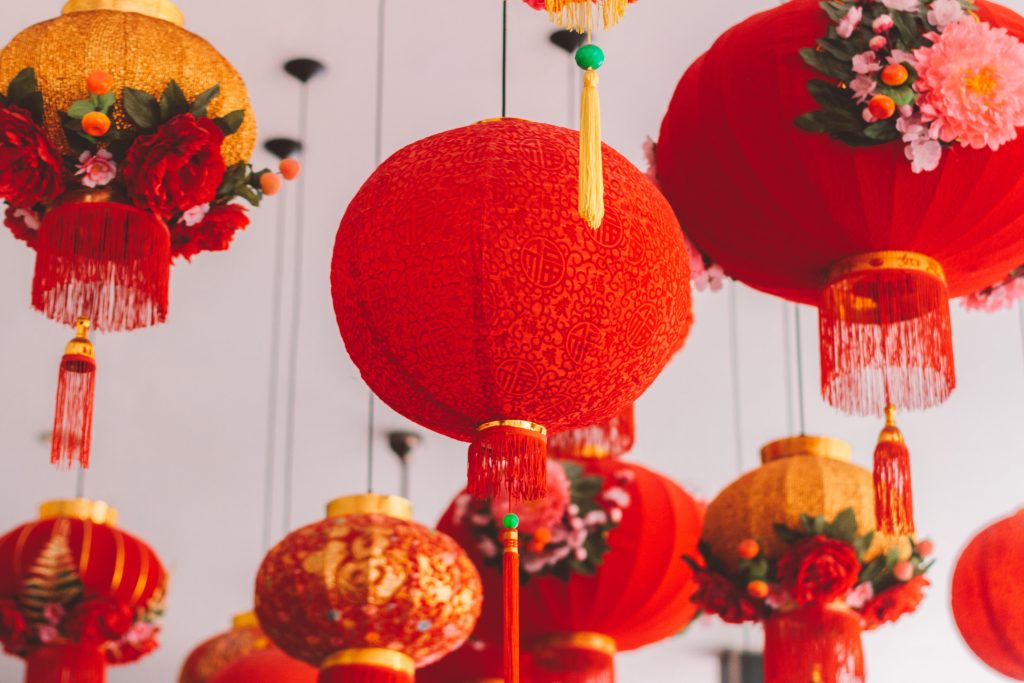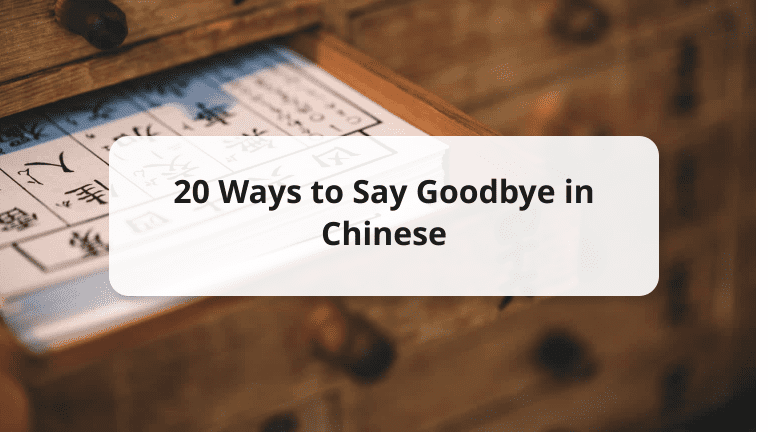Learning to say “goodbye” is as important as saying “hello” and even more important is using the right words for goodbye. This is especially important with Chinese as Mandarin has four different tones or pitches which means that the way a word is said can have four different meanings. There are four tones in the mandarin language:
- The first tone is level and high pitch
- The second tone is a rising pitch in ascending order
- The third one starts off neutral, dips lower, and picks up to a higher tone
- The fourth tone starts off with a syllable and then quickly dips sharply
The official transcription system that helps in pronouncing Chinese tones is known as the Pinyin alphabet. Hanyu Pinyin (simplified Chinese: 汉语拼音; traditional Chinese: 漢語拼音; pinyin: hànyǔ pīnyīn) is the official romanization system of Mandarin Chinese and will be used throughout the article. You can also learn hello in Chinese.
20 ways to say goodbye in Chinese
Saying goodbye in Chinese has several variations and in this article, we’ll look at 20 different ways and provide a brief explanation of its use in a practical setting. The list includes a collection of general goodbye sayings, more time-related sayings, and a few idioms.
Goodbye in Chinese: General goodbyes
The first section of this list is learning general ways you can say goodbye in any setting. There may be some limitations as we unraveled these but these should help you ease into the language.
1- 再见 (simplified), 再見(traditional), zài jiàn (pinyin) —> Goodbye (English)
This is probably the most commonly used version of “goodbye”. You’d think native Mandarin speakers would use this often but it’s actually uncommon for them.
The direct translation of 再见 or zài jiàn is “see you again” therefore you’d typically use his if you intend to see the person again or there’s a promise of a reencounter.
ex: 那今天先這樣!再見啦!(traditional) 那今天先这样!再见啦!(simplified)
Nà jīntiān xiān zhèyàng! Zàijiàn la!
That’s it for today! Goodbye!
2- 拜拜 (simplified and traditional), Bàibài (pinyin) —> Bye bye (English)
This version of “goodbye” is friendly and can be used when parting with friends, new acquaintances, someone you’ve just met, people with whom you have a good relationship, and even seniors. However, it should not be used in formal settings such as with business partners.
3- 再会! (simplified), 再會(traditional), Zài huì (pinyin) —> Meet you again (English)
This saying leans towards the English saying “catch you later!”; it is informal, and you’d likely use it with friends, close family relatives, or acquaintances.
4- 再联系 (simplified), 再聯繫!(traditional), Zài liánxì (pinyin) —> Let’s keep in touch (English)
Zài liánxì is used when you want to emphasize maintaining contact with the other person. For example, in English, you’d similarly use phrases such as “we’ll talk”, or “let’s keep in contact”. In essence, this Zài liánxì can be used as a polite way of parting and also showing interest in future encounters while encouraging the person to keep in contact.
If we break the Mandarin phrase, 再 (zài) directly translates to “again”, while 联系 (liánxì) translates to “contact” or “connect”.
Let’s use an example: suppose you’re running errands and you run into a friend but unfortunately can;t engage in a conversation due to your schedule. You can say Zài liánxì letting them know that you’d love to chat but unfortunately can’t at that moment. If we go deeper, Zài liánxì can also be used as a polite way to say goodbye to a person but just for the sake of being kind. So you can say Zài liánxì even though you know you won’t follow up.
5- 再联络 (simplified), 再聯絡!(traditional), Zài liánluò (pinyin) —> Keep in touch (English)
Similar to 再联系 (Zài liánxì), 再联络 (Zài liánluò) carries the same meaning which is to tell the other person that you’ll stay in touch or maintain contact.
6- 再约 (simplified), 再約!(traditional), Zài yuē (pinyin) —> Reappointment (English)
To understand this phrase better, let’s break down each Chinese character and its meaning. In the first part, we have 约 (yuē) which means “appointment”, and 再 (zài) means again (just like in the above example). The direct translation in English is “to appoint again” or “reappointment” as specified above. In essence, this phrase simply means “let’s meet again”.
You’d likely want to use it when you’re keen to continue the conversation or set an arrangement to see the person some other time.
7- 失陪 (simplified and traditional), Shīpéi (pinyin) —> Excuse me (English)
To understand the phrase Shīpéi and make meaning, let’s break the Mandarin phrase up. If we take 失 (shī) it literally means to “fail,” “miss,” or “lose,” while 陪 (péi) means “accompany” in English. If we group these together, it would mean “to fail to accompany” or “miss the opportunity to accompany” etc. Therefore, the literal translation of this would be “fail to accompany,”. The inference here would be that it is a polite way of asking the person room for you to leave.
This phrase can be used in a formal setting when you’d like to announce your departure courteously.
8 – 回头见 (simplified), 回頭見 (traditional), Huítóu jiàn (pinyin) —> See you later (English)
Huítóu jiàn directly translates to “See you!” or “See you soon!” or “See you when I see you”. This phrase is used when you’re sure you’re going to meet the person soon whether it is today, tomorrow, or weeks from the day.
Fun fact: the literal translation of 回头见 is “See you when I turn my head back” which you’d obviously not use as it doesn’t make sense in English but the implied meaning is that you’d see the person at a future time.
9 – 有空再聊 (simplified and traditional), Yǒu kòng zài liáo (pinyin) —> Let’s talk when you have time (English)
The phrase Yǒu kòng zài liáo could also mean “Let’s talk again when you’re free or available” It is an informal and casual way of bidding farewells to friends or close relatives.
Let’s break down the Mandarin phrase: 有空 directly translates to “have space/availability” and 再聊, translates to “talk again” in English. It’s important to note however that the subject isn’t specified here so it could mean “Let’s talk again when I am free” or “Let’s talk again when we’re free” and because of this, this phrase is highly dependent on the context.
ex: 我還有事,我們有空再聊。(traditional) 我还有事,我们有空再聊。(simplified)
Wǒ hái yǒushì, wǒmen yǒu kòng zài liáo.
I still got stuff to do. Let’s talk again when we’re free.
10- 失陪了 (simplified and traditional), shī péi le (pinyin) —> Excuse me. I have to leave now (English)
失陪了 (shī péi le) is used when you politely want to excuse yourself and is mostly used in business or work settings.
An alternative to 失陪了 (shī péi le) is 失陪一下 (shīpéi yīxià) and you’d notice the main difference here is 一下 (yīxià) at the end of the phrase. 一下 (yīxià) means “for a while” or “for a bit.” Therefore, the translation for 失陪一下 (shīpéi yīxià) in English would be “Please excuse me for a while.”

Goodbye in Chinese: Time-Related Goodbyes
In this section, we’ll look at ways a person can say goodbye while emphasizing a certain time when you will meet again. These phrases relay a time frame—it could be used in formal settings or when you’re planning a meet-up for sometime soon with a friend or acquaintance.
1- 等等见 (simplified), 等等見 (traditional), Děng děng jiàn (pinyin) —> See you later (English)
As you’ve picked up from the trend, breaking up Chinese characters makes understanding the overall phrase easier. So with 等等见 (Děng děng jiàn), 等 Děng is a verb that means “to wait”, and 见 (jiàn) is also a verb that means “to meet”. The literal translation would be “wait a bit and we’ll meet” or better yet “we’ll meet in a bit”.
This phrase is best used when you’re wanting to assure the other person that you are keen to meet but politely ask the other person to be patient a while. In context for example, if someone calls you to ask when you intend to join them at their home or date night, saying “We’ll meet in a bit” could be used to confirm that you’ll show up later.
ex: 我先回家換衣服,我們等等見!(traditional) 我先回家换衣服,我们等等见!(simplified)
Wǒ xiān huí jiā huàn yīfú, wǒmen děng děng jiàn!
I’ll go home to change my clothes first, we’ll meet in a bit!
2- 一会儿见 (simplified), 一會兒見 (traditional), Yīhuǐ’er jiàn (pinyin) —> See you later (English)
In English, Yīhuǐ’er jiàn translates to “See you in a while!” or “See you later!” This phrase is perfect to use when you’re parting ways with the person temporarily but e careful to use this if you’re actually intending to see the person in a while. Native speakers use this phrase when they’re confident that they will meet the person on the same day.
3- 明天见 (simplified), 明天見 (traditional), Míngtiān jiàn (pinyin) —> See you tomorrow (English)
Looking at this phrase, 明天 (Míngtiān) translates to tomorrow, and again 见 (jiàn) is a verb that means “to meet”. So together it means “See you tomorrow” an indication that both parties are confident that you’ll be able to see one another the next day.
4- 晚安 (simplified and traditional), wǎn’ān (pinyin) —> Goodnight! (English)
Now imagine parting with someone for the night and forgetting how to say “Goodnight”….awkward! 晚安 (wǎn’ān) is another way to say goodbye, or more specifically, goodnight.
In English, 晚 (wǎn) translates to “night” or “evening”, while 安 (ān) means “safe” or “peace.” Together it means wishing someone a peaceful rest or night. This phrase could be used between friends or family members when parting at night or saying goodnight when you’re headed off to bed.
5- 周一见 (simplified), 週一見 (traditional), zhōuyī jiàn (pinyin) —> See you on Monday! (English)
You might be thinking, “why’s there a dash in the middle?” Well in Chinese, every character has a meaning. In this case, 周一 translates to “on Monday”. The phrase 周一见 can be used when you’re planning to or likely going to be seeing the person on Monday.
Fun fact: Native Chinese speakers commonly use 周一见, but you might also hear the phrase 星期一见 (xīngqí yī jiàn), which bears the exact same meaning. Check out Chinese numbers so you know how to say it in Monday to Sunday.
ex: 謝謝你週末陪我,我們週一見!(traditional) 谢谢你周末陪我,我们周一见!(simplified)
Xièxiè nǐ zhōumò péi wǒ, wǒmen zhōuyī jiàn!
Thank you for accompanying me this weekend, see you on Monday!
6- 明年见 (simplified), 明年見 (traditional), Míngnián jiàn (pinyin) —> See you next year (English)
年 (nián) means year and 见, means “to meet” or “to see” hence the English translation see you tomorrow. The phrase Míngnián jiàn is used when you are confident that you will meet the person the next year. This phrase is a casual and informal way of bidding goodbye.
Míngnián jiàn can be used with friends, colleagues, or classmates.
7- 下个月见 (simplified), 下個月見 (traditional), xià gè yuè jiàn (pinyin) —> See you next month (English)
Here’s another great phrase that you could use for future reference:下个月见 (xià gè yuè jiàn), which means “See you next month!”. In this phrase,下 means “next”.
Fun fact: (Notice the reverse symbol from 下) 上 (shàng) is the phrase you’d use to refer to the previous week or month. For instance, 上个月 (shàng gè yuè) refers to “last month” in the Chinese language.

Goodbye in Chinese: Idioms
There’s a common belief that learning Chinese proverbs or idioms is a good tool for learning the language because they’re short and easy to remember. The simplified character for idioms in Chinese is 成语. Idioms also teach us the art of Chinese culture and the familiar you become with Chinese idioms, the better the relationships you form with native speakers.
There are two broad classifications of Chinese proverbs, namely 谚语 yànyǔ which means “Proverbs or ‘familiar saying’” or 成语 chéngyǔ which translates as “idiom” or “accepted saying”`. Chengyu is made up of four characters and you’re likely to find a Chengyu or “Idiom” for every possible scenario
Below are three good but advanced or complex idioms that are recommended as you journey into Chinese language proficiency.
1- 生离死別 (simplified), 生離死別 (traditional), shēng lí sǐ bié (pinyin) —> Part forever (English)
This phrase is essentially a phrase of bereavement. It means “To be separated in life and death” or “To part forever”.
2- 劳燕分飞 (simplified), 勞燕分飛 (traditional), Láoyànfēnfēi (pinyin) —> Not wishing to part (English)
The idiom Rénshēng hé chù bù xiāngféng is used when you run into someone you have lost contact for a while or someone you haven’t seen in years. It could also be used when someone you know unknowingly is acquainted with someone you’ve known for years. The English definition of Rénshēng hé chù bù xiāngféng is “It’s a small world”.
Summary chart
To summarize all that we’ve learned with the exception of the idioms, here’s a chart that compiles all ways the vocabularies of the general goodbyes and time-related goodbyes are written.
| Pinyin romanization | English translation | Simplified characters | Traditional characters |
| General Goodbyes | |||
| Zài jiàn | Goodbye | 再见 | 再見 |
| Bàibài | Bye bye | 拜拜 | |
| Zài huì | Meet you again | 再会! | 再會 |
| Zài liánxì | Let’s keep in touch | 再联系 | 再联系! |
| Zài liánluò | Keep in touch | 再联络 | 再聯絡 |
| Zài yuē | Reappointment | 再约 | 再約 |
| Shīpéi | To fail to accompany | 失陪 | 失陪 |
| Huítóu jiàn | See you later | 回头见 | 回頭見 |
| Yǒu kòng zài liáo | Let’s talk when you have time | 有空再聊 | |
| Shī péi le | Excuse me. I have to leave now | 失陪了 | |
| Time-related Goodbyes | |||
| Děng děng jiàn | See you later | 等等见 | 等等見 |
| Yīhuǐ’er jiàn | See you in a while | 一会儿见 | 一會兒見 |
| Míngtiān jiàn | See you tomorrow | 明天见 | 明天見 |
| Wǎn’ān | Goodnight! | 晚安 | |
| Zhōuyī jiàn | See you on Monday! | 周一见 | 周一見 |
| Míngnián jiàn | See you next year | 明年见 | 明年見 |
| Xià gè yuè jiàn | See you next month! | 下个月见 | 下個月見 |
Let’s bring it all together
If you’ve made it to the end of this article, well done! When you consider all the characters, definitions, and context-specific usage of the “Goodbye” phrases, it can feel like a mountain to climb to gain proficiency in Chinese. I would encourage that despite how vast the language is, it is absolutely possible to achieve your goals into fluency in Chinese. The more attention you pay to tone, the better you are on your way.
This article hopes to give the reader a one-stop guide to learning how to say “Goodbye” in Chinese and gives you language learning benefits as it sets the foundation as you continue on your language learning journey. Start finding your Chinese tutor on AmazingTalker today! You can also learn goodbye in French , so you can also talk to French people too.
















